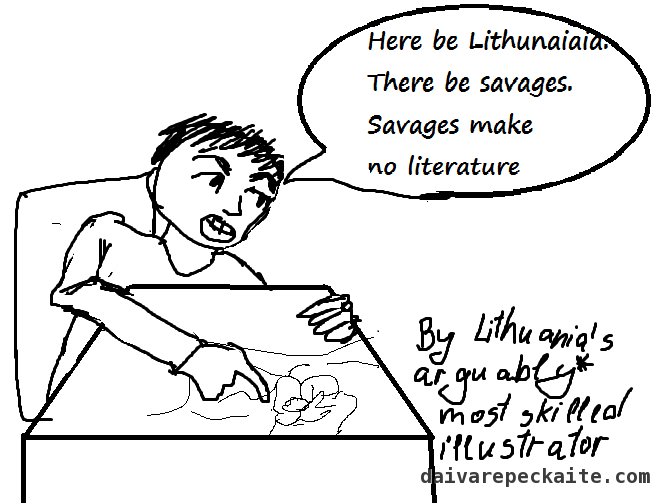Culture reporting is every bit as serious as war reporting.
– My friend Alexandra Belopolsky, a culture reporter
Several of my Facebook friends shared this map, which claims to represent each country’s favorite book. How does one measure that, the creators did not bother to explain too much. A reddit list became the primary venue to crowdsource this information, but clearly the author came up with the list out of the blue and did not quite respond to comments. Some of my friends were pleased to find respectable works of literature representing their ancestral or adoptive homelands. Lithuanians, it seems, were left puzzled.
It would be curious if it was true – ‘White field, black sheep’ by Daiva Markelis would stand out in this largely male list of cultural influencers. The author’s misgendered family name signifies that her main ID document is not from Lithuania. So, an emigre woman. Yet both Lithuanian redditers on the original list and numerous commentators on social networks have pointed out never having heard of that book. The calls of Lithuanian redditers to include some actually popular literature fell on deaf ears, and the map stayed with the book that – wait for it – is not even Lithuanian.
Yet it is not the obscure representative of Lithuania that first got me doubting the method of that list. With all my respect and admiration for Khaled Hosseini, he is essentially a 1.5-generation American author with an aim to make his native Afghanistan palatable for Western audiences. His experience in North America and his cultural competence in finding a key to American hearts are just as formative for his talent as his early days in Afghanistan.
It may also be true that no world-famous writer was born in Algeria after Albert Camus, but I have serious doubts, and hardly any way to fact-check, whether his account of a colonizer like himself killing an unnamed local Arab is really the most beloved book among Algerians.
Again, I would not know where to look with regard to these countries, but I can certainly fact-check on Lithuania. Markelis, whom I rightly guessed to be a Lithuanian American, published her book with the University of Chicago Press and received some favorable reviews (also in Lithuanian). Yet this book does not exist in Lithuanian. The authors of this map claim that Lithuania’s favorite book is one that is not available in the language of that country.
A friend who posted this map says that the list does not aim at academic quality and that there might be ‘mistakes’. But this is not a mistake – Camus, Hosseini and Markelis reveal the workings of their method. Essentially the map is about books with keywords related, in one way or another, to different countries and available to American readers. Indy100, a website of The Independent, called this list ‘brilliant’ and described some of the ‘tough choices’ of ‘arguably’ favorite or important books, but beyond the world’s former or current imperial countries there were no choices to be made.
As a list of literature available in English, it would be an interesting list. Books are powerful in shaping imagination, and from this list we can learn what works shape readers’ imagination in the world’s richest country. But the authors claim to do something else – to represent each country’s most influential book, completely disregarding these countries’ readers’, reviewers’ and publishers’ choices. The lie about the nature of this map was repeated on Vice Creators, Indy100, The Culture Trip and heaven knows how many translated articles to make this map look more credible than it is. But instead of probing the method or verifying the sources, these websites praised the author for making the map and even – gasp! – including African literature.
The FB friend who was the latest to share the map said that my criticism has ruined her pleasure of looking at the world covered in books. I understand her point, but there is something much deeper under the choice of the map’s author to go for the most hegemonic publishing houses in order to mix Nobel prize winners or actual canonical authors from some countries with famous Americans/ colonizers from those countries to build a map conveniently called ‘arguably favorite or the most important’ books. The underlying assumption is that when it comes to less known countries, one is free to ‘creatively’ mix and match information and lies to get likes and shares. Daiva Markelis’s book may be very nice and very interesting – now I really want to read it. Still, by no parameter is it Lithuania’s favorite and most important novel. Claiming otherwise is misinformation.
As such, it is nothing short of cultural imperialism. As Edward Said wrote in Orientalism, Western imagination sees the Orient as perpetually ready for gaze and consumption. The purpose of the map is not to show the richness of world literature, but to flatten it, to make a claim that non-dominant countries’ languages, publishers, reviewers, school curricula and readers, their actual choices and preferences are irrelevant. The only thing that matters is whether the book is ready for American consumption. Another assumption is that one can get away with misinformation about culture, because the non-dominant cultures are expected not to have a strong voice to challenge it and they should be happy to be mentioned at all.
This is not trivial. Going back to my friend’s quote at the top, some countries are at war, cultural and otherwise, and imagination of these countries matters. It makes me doubt the platforms that uncritically post these things. It makes me doubt crowdsourced information. And it makes me wonder how far other cultural misinformation would travel.


